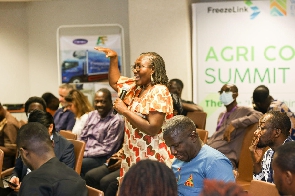The Country Manager for Swissport, Chris Goodsir, has said that the ragging war in Ukraine offers a big window of opportunities for exporters in West Africa to make good returns should they target the European market. According to him, the war is affecting greenhouses in Europe, making it unable to produce the needed fruits and vegetables for the market there and that is something Ghanaians and other exporters in the sub-region can take advantage of. Speaking at the first-ever West Africa Agri Cold Chain Summit in Accra, convened by FreezeLink, a cold chain logistics firm, he urged businesses to be proactive in this regard. “War in Ukraine is creating an energy shortage in Europe that will see greenhouses, used for growing fruit and vegetables, having to reduce their hours of operation. “The resulting shortage of fruit and vegetables means that exporters of these crops in West Africa have an opportunity to sell higher volumes of exports to Europe but at higher prices, too,” he said. The summit targets breakthroughs for horticulture exports and forex generation. Chris Goodsir added that with this opportunity, exporters can export temperature-sensitive food by harnessing cold chain logistics, especially at a time when Ghana is desperately in need of export-driven foreign exchange. “We have enquiries from Spain, where they prefer our fruits. It is because GMOs in their own markets have reduced the taste of their home-grown varieties. We have an advantage” he explained. Other experts further pinpointed opportunities for the fruit and vegetable export stakeholders in attendance. FreezeLink’s CEO, Owusu Akoto, adding his contributions to the infra-Africa trade opportunity, said the company is close to finishing building a World Bank-funded refrigerated, fruit and vegetable terminal at the Cotonou International Airport. He said that it will enable Benin farmers of chilli pepper, mango, banana, pineapple and pawpaw to export their produce to high-value international markets. “Initiatives like the African Continental Free Trade Area (AfCTA) can only make their way from dreams to reality if we have infrastructure that creates connectivity. Cold chain represents such vital connectivity for the food and healthcare sectors” he said. The event held at the Ghana Shippers House on October 25, 2022, which was under the theme, ‘Unleashing Ghana’s Fruit and Vegetable Exports,’ brought together key stakeholders in the pharmaceutical and fruit and vegetable export sectors. The discussions touched on the war in Ukraine and increased fruit and vegetable exports for Ghana; the connection between ‘pre-cooling’ and Ghana’s currency crisis; and the reason why African fruit and vegetable exports, on average, earn 55 percent below the global price for the same produce. In a speech entitled ‘Horticulture Exports - what the Winners in Africa are doing to succeed and how the public sector helps,’ Dr Michele Bruni, co-founder and Chief Commercial Officer of InspiraFarms, an international cold chain equipment manufacturer, he said working across Africa, “Intra Africa trade is a hugely overlooked opportunity across the continent." "One of our partners in Zimbabwe recently began selling apples in the Democratic Republic of Congo at higher prices than it sells them in its traditional market of Singapore. What makes these profits possible? “Precooling and an unbroken cold chain. Precooling is critical. For every hour after harvest that produce is not precooled, it loses one day of shelf life. But poor-quality pre-cooling can also lead to a loss of water, and therefore value.” The conference also shed unusual light on the role of public sectors around Africa in promoting fruit and vegetables and of particular insight. On that score, by Dr Michele Bruni stated that “One visionary African country, who I cannot disclose just yet, will announce this year that all fruit and vegetable exports have to go through an unbroken cold chain. They are ensuring low post-harvest losses for their farmers, long shelf life and high prices for their horticulture exports. This rising tide will lift all ships.” The summit was sponsored by a global provider of cold chain solutions, Carrier and ADDFRA, their local partner while Water for Energy and Food Grand Challenge (WE4F), a program focused on environmentally sustainable innovations aiming to improve energy and water efficiency in the agricultural sector, co-hosted the event.
Click to view details



Business News of Saturday, 5 November 2022
Source: www.ghanaweb.com

















